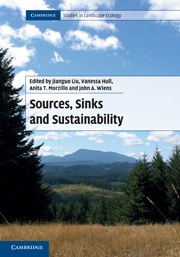Preface
Published online by Cambridge University Press: 05 July 2011
Summary
Organisms and populations are discontinuously distributed in space and change over time. As a result, conserving and managing ecological systems requires an understanding of how these systems and their patterns, processes and dynamics vary and interact in space and time. More than two decades ago, H. Ronald Pulliam developed a conceptual framework of spatial population dynamics to address this need. In his 1988 paper (“Sources, sinks, and population regulation,” American Naturalist 132: 652—661), Pulliam created a framework that envisioned that populations in “sink” (poor) habitats would rely on inputs from “source” (good) habitats in order to persist. The dynamics of population segments across heterogeneous landscapes were linked. This simple yet powerful framework has inspired numerous studies and has provided the foundation for rapid advances in ecological theory and practice.
To reflect upon and synthesize the development of thinking and research inspired by Pulliam’s framework, a symposium on “Sources, Sinks, and Sustainability across Landscapes” was held at the 2008 annual conference of the US Regional Association of the International Association for Landscape Ecology (US-IALE) in Wisconsin, USA. The symposium, organized in honor of Pulliam’s retirement, amply illustrated his many contributions to ecology, animal behavior, evolution, and other fields, through his former roles as Regents Professor and Director of University of Georgia’s Institute of Ecology, Director of the National Biological Service, Science Advisor to the Secretary of the Interior, and the President of the Ecological Society of America. The 30 presenters from around the world included Pulliam’s former students and postdoctoral associates, as well as other leading scholars who have been influenced by Pulliam’s work.
- Type
- Chapter
- Information
- Sources, Sinks and Sustainability , pp. xiii - xvPublisher: Cambridge University PressPrint publication year: 2011



